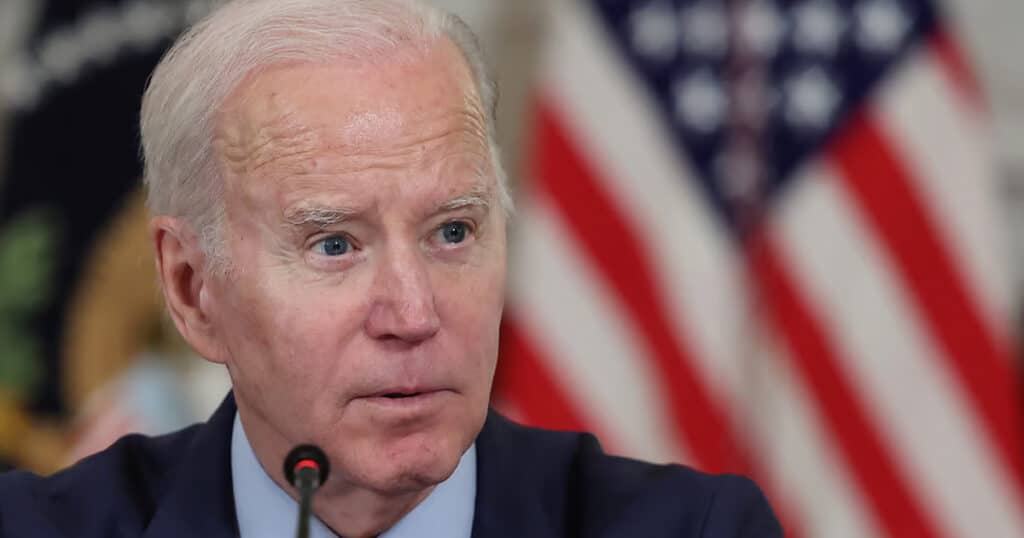
Biden’s Job Approval a Sign He Should Reconsider Running for 2nd Term
When sitting presidents begin thinking about reelection, the one factor they should seriously consider is their current job approval rating. It is a remarkably accurate predictor of whether that president will be successful in winning another term.
History shows us that incumbent presidents with approval ratings below 50% in their election year do not win reelection, or fearing defeat, wisely choose not to run again.
President Biden, with a current job approval of 41.7% according to the RealClearPolitics average, should think seriously about packing up and retiring in 2025 to his seaside home in Rehoboth Beach, Del.
Consider the historical evidence compiled over the past seven decades:
- In 1952, Democratic President Harry Truman, beset by economic woes and an unpopular war in Korea, in March of that year hit a job approval low of 22%. He lost the New Hampshire primary in that same month to Tennessee Sen. Estes Kefauver and chose not to run again.
- In 1968, Democrat Lyndon Johnson, mired in a bloody war in Vietnam that divided Americans, saw his job approval sink to 36% in March of that year and, on March 31, declined to run for a second full term.
- In 1976, Republican Gerald Ford, who ascended to the presidency in ’74 when Richard Nixon resigned over involvement in the Watergate scandal, ran for election on his own. Faced with high inflation and a job approval rating in the mid-40s during the fall campaign, Ford lost to former Georgia Gov. Jimmy Carter, a Washington outsider who promised a fresh start.
- In 1980, Carter – beset by gas shortages, high energy prices, the Iran hostage crisis, and double-digit inflation – saw his job approval sink to the low-40s during the fall election. He lost in a landslide to former California Gov. Ronald Reagan.
- In 1992, President George H. W. Bush, who saw his job approval soar to 89% after the successful First Gulf War, watched it plummet below 40% in the autumn of ’92 as the domestic economy tanked. Bush lost his bid for a second term to Arkansas Gov. Bill Clinton, who made the sagging economy his No. 1 issue.
- And in 2020, President Donald Trump sought a second term with job approvals in the low-to-mid 40s during the fall campaign. Beset by a COVID crisis and plenty of rhetorical bombast, he lost to former Vice President Joe Biden in a tight race.
Given that history, Biden should take hints from fellow Democrats Truman and Johnson and consider scrapping his plan to seek reelection in 2024. His current 41% job approval rating is in the danger zone. In fact, his job approval hasn’t been above 50% since August 2021, shortly before the disastrous Benghazi withdrawal.
Many Americans not only have concerns about the way Biden is managing the country, but they also see growing physical evidence that at age 80, he is just too old to run another bruising year-long campaign and serve another four years. So, with the 2024 vote still more than 13 months away, it’s not too late for Biden to drop out and open the field to some younger, fresher-faced Democrats.
The pool is large. Among them are California Gov. Gavin Newsom, 55; Michigan Gov. Gretchen Whitmer, 52; Minnesota Sen. Amy Klobuchar, 63; Transportation Secretary Pete Buttigieg, 41; Vice President Kamala Harris, 58; New Jersey Sen. Cory Booker, 54; North Carolina Gov. Roy Cooper, 66; and New York Rep. Alexandria Ocasio-Cortez, 33.
Ocasio-Cortez, whose birthday is in October, will be 35, the minimum age for the presidency, by Election Day 2024.
Moreover, perhaps First Lady Jill Biden, 72, might want to give it a try. She appears to enjoy her role as first lady. Michelle Obama, 59, is also a possibility. And maybe former U.S. senator and secretary of state Hillary Clinton would consider a third run, although she will be 76 next month.
Republicans, with Trump as the standard bearer, face a similar age problem, although not quite as visible as the one Democrats have with Biden. Trump, at 77, still appears to be full of energy. Currently, all major polls show him far ahead in the primary race for the 2024 GOP nomination.
But considering his advancing age – and the colossal pile of legal problems, criminal indictments, and court dates he faces – Trump, too, should seriously think about giving way to a younger field of Republicans who carry much lighter political baggage than he. A Trump exit would spare the country a tsunami of turmoil, angst, bombast, and legal drama over the next 13 months. Who needs it? Everyone is exhausted.
The GOP list of presidential hopefuls challenging Trump for the nomination includes former Vice President Mike Pence, 64; Florida Gov. Ron DeSantis, 45; former South Carolina governor and U.N. ambassador Nikki Haley, 51; South Carolina Sen. Tim Scott, 58; former New Jersey Gov. Chris Christie, 61; former Arkansas governor Asa Hutchinson, 72; North Dakota Gov. Doug Burgum, 67; and businessman Vivek Ramaswamy, 38.
Their biggest problem is that when it comes to gaining media coverage, the bombastic Trump hogs up all the oxygen. And when they do get media coverage, it is mostly negative.
In sum, American voters are troubled by an erratic economy, high inflation, continued uncertainty about COVID, declines in education achievement, foreign policy turmoil, a porous Southern border, rising urban crime and street violence, a war in Ukraine, and the saber-rattling of China. They need younger candidates with innovative approaches and a fresh start. A Biden-Trump rematch will not deliver that.
This article was originally published by RealClearPolitics and made available via RealClearWire.


